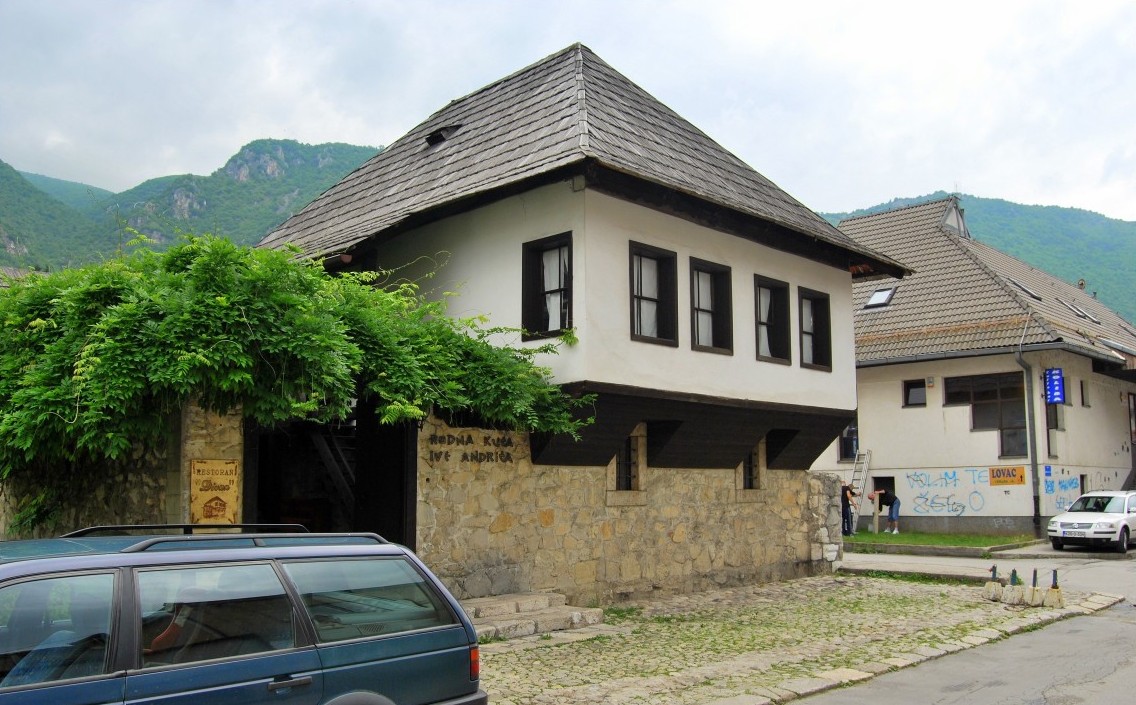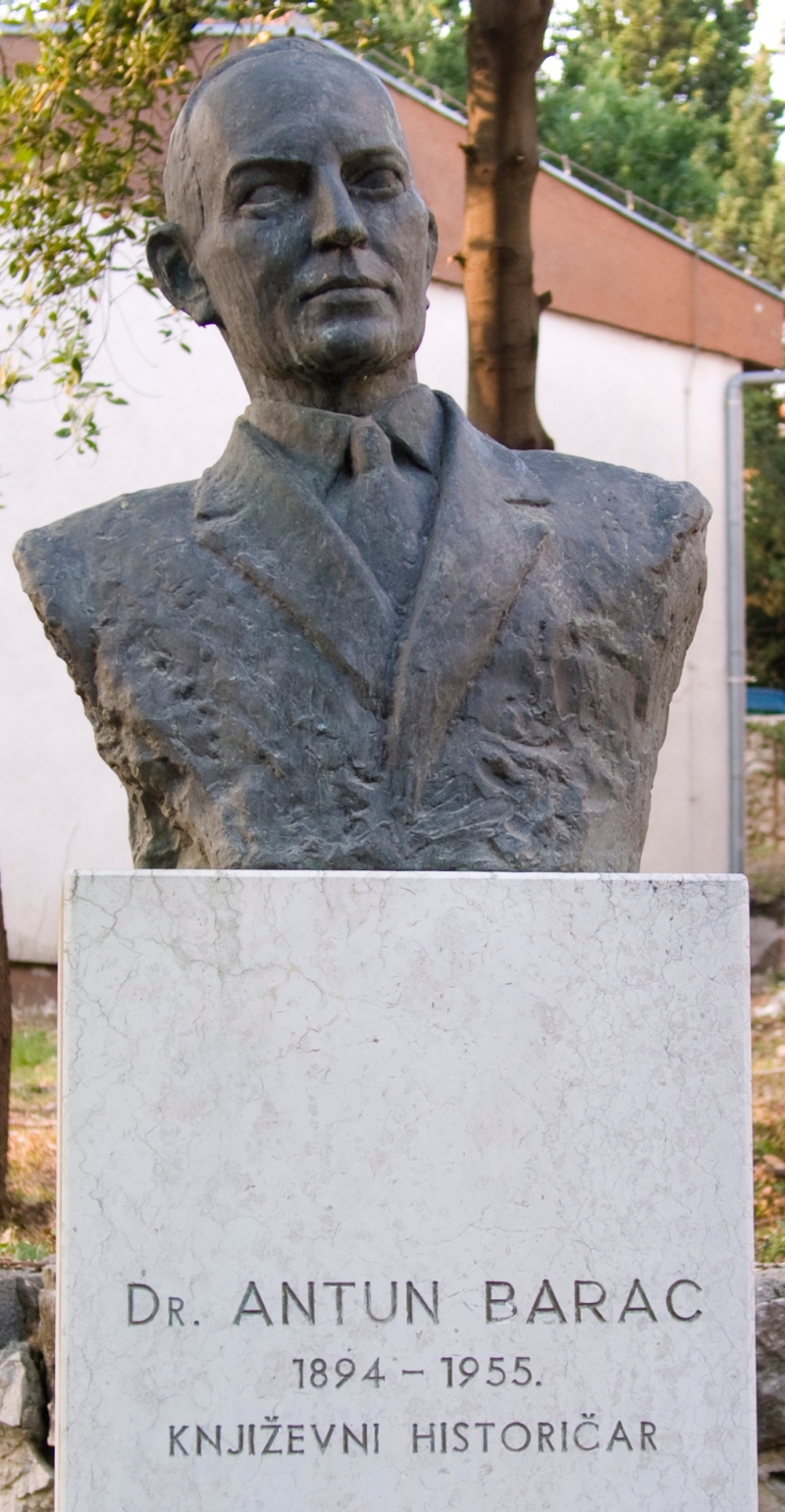|
Književni Jug
''Književni jug'' ( sh, The Literary South, ) was a literary magazine published in 1918 and 1919 in Zagreb. In the spirit of idea of integral Yugoslavism involved authors sought to prepare the ground for future Yugoslav literature. From January to July 1918, its editors were Ivo Andrić, Niko Bartulović, Vladimir Ćorović and Branko Mašić. It was one of the most influential pro-Yugoslav journals in that time. Journal published Serbo-Croatian works in both Serbian Cyrillic alphabet and Gaj's Latin alphabet, as well as untranslated works Slovene. In July 1918, Anton Novačan and Miloš Crnjanski joined journal, while Ćorović left it.''Jugoslovenski književni leksikon'' (page 224-225), Živan Milisavac, Matica Srpska, Novi Sad, 1971. Prominent authors whose works are published in ''Književni jug'' include Tin Ujević, Miroslav Krleža, Antun Barac, Vladimir Nazor, Isidora Sekulić, Sima Pandurović, Aleksa Šantić, , Ivo Vojnović, Dragutin Domjanić, Dinko Šimunović, Gu ... [...More Info...] [...Related Items...] OR: [Wikipedia] [Google] [Baidu] |
Ivo Andrić
Ivo Andrić ( sr-Cyrl, Иво Андрић, ; born Ivan Andrić; 9 October 1892 – 13 March 1975) was a Yugoslav novelist, poet and short story writer who won the Nobel Prize in Literature in 1961. His writings dealt mainly with life in his native Bosnia under Ottoman rule. Born in Travnik in Austria-Hungary, modern-day Bosnia and Herzegovina, Andrić attended high school in Sarajevo, where he became an active member of several South Slav national youth organizations. Following the assassination of Archduke Franz Ferdinand in June 1914, Andrić was arrested and imprisoned by the Austro-Hungarian police, who suspected his involvement in the plot. As the authorities were unable to build a strong case against him, he spent much of the war under house arrest, only being released following a general amnesty for such cases in July 1917. After the war, he studied South Slavic history and literature at universities in Zagreb and Graz, eventually attaining his PhD. in Graz in 1924 ... [...More Info...] [...Related Items...] OR: [Wikipedia] [Google] [Baidu] |
Gaj's Latin Alphabet
Gaj's Latin alphabet ( sh-Latn-Cyrl, Gajeva latinica, separator=" / ", Гајева латиница}, ), also known as ( sh-Cyrl, абецеда, ) or ( sh-Cyrl, гајица, link=no, ), is the form of the Latin script used for writing Serbo-Croatian and all of its standard varieties: Bosnian, Croatian, Montenegrin, and Serbian. The alphabet was initially devised by Croatian linguist Ljudevit Gaj in 1835 during the Illyrian movement in ethnically Croatian parts of Austrian Empire. It was largely based on Jan Hus's Czech alphabet and was meant to serve as a unified orthography for three Croat-populated kingdoms within the Austrian Empire at the time, namely Croatia, Dalmatia and Slavonia, and their three dialect groups, Kajkavian, Chakavian and Shtokavian, which historically utilized different spelling rules. A slightly modified version of it was later adopted as the formal Latin writing system for the unified Serbo-Croatian standard language per the Vienna Literary ... [...More Info...] [...Related Items...] OR: [Wikipedia] [Google] [Baidu] |
Dinko Šimunović
Dinko Šimunović (1 September 1873 – 3 August 1933) was a Croatian writer. Dinko Šimunović was born in Knin. He spent almost two decades as a teacher in villages of the Zagora, the hinterland of Dalmatia. He retired in 1927 and moved to Zagreb in 1929, where he died in 1933. Šimunović wrote many stories and two novels, all dealing with people from his native region. His contemporaries described his works as championing a patriarchal, hierarchical, black-and-white world, an impression further reinforced by author's personal distaste towards the modern, urban way of living. Biography Dinko Šimunović spent his early childhood in Koljane near Vrlika where his father was a teacher in Kijevo. Šimunović completed teacher's school in Arbanasi between 1888 and 1892. Works * "Mrkodol" (1909) * "Đerdan" (1914) * "Mladost" (The Youth, 1921) * "Alkar" (The Knight, 1908) * "Tuđinac" (The Foreigner, 1911) * "Porodica Vinčić" (Vinčić Family, 1923) * "Duga" (The Rainbow, 190 ... [...More Info...] [...Related Items...] OR: [Wikipedia] [Google] [Baidu] |
Dragutin Domjanić
Dragutin Domjanić (12 September 1875 – 7 June 1933) was a Croatian poet. Domjanić was born in Krči, a village near the town of Sveti Ivan Zelina. Having graduated law, he served as a judge in Zagreb and as a counsellor for Ban's Bench. He was a member of Yugoslav Academy of Sciences and Arts, the president of Matica hrvatska (1921–1926), and the president of Yugoslav PEN Club. In a struggle between the "old" and the "young" in the framework of Croatian Modernism, he sides with the "young". He versified motifs such as spiritual love, intimacy of the nobility mansions, marquises and cavaliers of the past days. He fears the brutality of the present, mourns the world dying off, he is incredulous of new ideas. His affection for the past directs him towards his mother tongue - Kajkavian. The most notable work of Domjanić is thus Kajkavian poem collection ''Kipci i popevke'', and the poems "Fala" and " Popevke sam slagal", both set to music by Vlaho Paljetak. Croatian comp ... [...More Info...] [...Related Items...] OR: [Wikipedia] [Google] [Baidu] |
Ivo Vojnović
Ivo Vojnović (9 October 1857 – 30 August 1929) was a writer from Dubrovnik. Biography Vojnović was born in Dubrovnik as the first son of Count Konstantin Vojnović (1832–1903) and Maria de Serragli (1836–1922) on 9 October 1857 in Dubrovnik, the Habsburg monarchy. He was a member of the Serbian noble House of Vojnović through his father. His mother was of noble Florentine descent. The city of his birth and its history had an important influence on his later literary work. Most of his childhood however he spent in Split. He had a famous younger brother Lujo Vojnović, who would later play an important political and cultural role in the late 19th- and 20th-century Dalmatia and Montenegro. As a young man he moved to Zagreb with his family, where he graduated from the University of Zagreb Faculty of Law in 1879. Until 1884 he served as a trainee of the Royal Court Table in Zagreb. After that he continued his judicial career in Križevci (1884-1889), Bjelovar (1889), Z ... [...More Info...] [...Related Items...] OR: [Wikipedia] [Google] [Baidu] |
Aleksa Šantić
Aleksa Šantić ( sr-Cyrl, Алекса Шантић, (); 27 May 1868 – 2 February 1924) was a poet from Bosnia and Herzegovina. His poetry reflecting both the urban culture of the region. The most common themes of his poems are social injustice, nostalgic love, and the unity of the South Slavs. He was the editor-in-chief of the magazine '' Zora'' (1896–1901). Šantić was one of the leading persons of Serbian literary and national movement in Mostar. In 1914 Šantić became a member of the Serbian Royal Academy. Early life Aleksa Šantić was born into a Herzegovinian Serb family in 1868 in Mostar in the Ottoman Empire. His father Risto was a merchant, and his mother Mara was from notable Aničić family from Mostar. He had three siblings: brothers Jeftan and Jakov and sister Radojka known as Persa; another sister Zorica died in infancy. The family did not have much patience for Aleksa's lyrical talents. Just as Aleksa turned 10 years of age, Bosnia Vilayet (includin ... [...More Info...] [...Related Items...] OR: [Wikipedia] [Google] [Baidu] |
Sima Pandurović
Sima Pandurović ( sr-cyr, Сима Пандуровић; 14 April 1883 – 27 August 1960) was a Serbian poet, part of the Symbolist movement in European poetry at the time. He died in Belgrade on 27 August 1960. Works ;Selected works *, 1908 *, drama, 1910 *, 1912 *, 1918 *, 1920 *, 1921 *, 1927 *, 1931 *, V volumes, 1935—1937 *, 1955 *, 1959 ;Translations *''Le roi s'amuse'', 1904 *''Athalie'', 1913 *''Romanticne Duse'', 1919 *''Tartuffe'' *''Hamlet'' *'' Richard III'' *'' Henry IV'' *'' Macbeth'' Sources * Jovan Skerlić Jovan Skerlić (, ; 20 August 1877 – 15 May 1914) was a Serbian writer and literary critic.''Jovan Skerlić u srpskoj književnosti 1877–1977: Zbornik radova''. Posebna izdanja, Institut za knjizevnost i umetnost, Belgrade. He is seen as one ..., / History of Modern Serbian Literature (Belgrade, 1921), pp. 465–466. External linksArticle on Serbian Poetry [...More Info...] [...Related Items...] OR: [Wikipedia] [Google] [Baidu] |
Isidora Sekulić
Isidora Sekulić ( sr-cyr, Исидора Секулић, 16 February 1877 – 5 April 1958) was a Serbian writer, novelist, essayist, polyglot and art critic. She was "the first woman academic in the history of Serbia". Biography Sekulić was born in Mošorin, a village of Bács-Bodrog County, (now Serbia). Apart from her studies in literature, Sekulić was also well versed in natural sciences as well as philosophy. She graduated from the pedagogical school in Budapest in 1892, and obtained her doctorate in 1922 in Germany. Her travels included extended stays in England, France and Norway. Her travels from Oslo through Bergen to Finnmark resulted in ''Pisma iz Norveške / Letters from Norway'' meditative travelogue in 1914. Her collection of short stories, ''Saputnici,'' are unusually detailed and penetrating accomplishment in self-analysis and a brave stylistic experiment. She also spoke several classical as well as nine modern languages. Sekulić's lyrical, meditative, intr ... [...More Info...] [...Related Items...] OR: [Wikipedia] [Google] [Baidu] |
Vladimir Nazor
Vladimir Nazor (30 May 1876 – 19 June 1949) was a Croatian poet and politician. During and after World War II in Yugoslavia, he served as the first President of the Presidium of the Croatian Parliament (Croatian head of state), and first Speaker of the Croatian Parliament. Nazor is a well-known poet, writer, translator, and humanist. He was not an active politician until 1941, but had a significant political influence through ethical aspects of his work during prewar Kingdom of Yugoslavia. Early career Nazor's early work paralleled the rise of the Young Croatian literary movement. He acquired much literary popularity in Croatia writing about folk legends and stories, including ''Big Joseph'' (''Veli Jože'') (1908), which features a helpful and kind hearted giant named Jože living in the town of Motovun (Inner Istria). His verses in ''Hrvatski kraljevi'' (''Croatian Kings'') (1912) established him as a prominent patriot poet. ''Istrian Tales'' (''Istarske priče'') (1913 ... [...More Info...] [...Related Items...] OR: [Wikipedia] [Google] [Baidu] |
Antun Barac
Antun Barac ( Kamenjak, 20 August 1894 – Zagreb, 1 November 1955), was a Croatian historian. Biography Barac graduated at the Faculty of philosophy at the University of Zagreb in 1917, and received his Ph.D. as a high school professor on Sušak in 1918, with the thesis on Vladimir Nazor's poetry. Since 1930 he is a regular professor at the Faculty of Philosophy in Zagreb. He was accepted as a regular member of Yugoslav Academy of Sciences and Arts in 1947. He edited numerous scientific editions and anthologies, and has written high school handbooks together with Nazor. He served as a prorector of the University of Zagreb after his rectorship mandate expired (1950–1951). He was a significant contributor to modern Croatian literary theory, especially in the position of Croatian literature in the European context. He published numerous monographies on top Croatian artists such as Nazor, Šenoa, Vidrić or Mažuranić, a number of critic-essayist writings on lesser kn ... [...More Info...] [...Related Items...] OR: [Wikipedia] [Google] [Baidu] |
Miroslav Krleža
Miroslav Krleža (; 7 July 1893 – 29 December 1981) was a Yugoslav and Croatian writer who is widely considered to be the greatest Croatian writer of the 20th century. He wrote notable works in all the literary genres, including poetry (''Ballads of Petrica Kerempuh'', 1936), theater ('' Messrs. Glembay'', 1929), short stories (''Croatian God Mars'', 1922), novels (''The Return of Philip Latinowicz'', 1932; ''On the Edge of Reason'', 1938), and an intimate diary. His works often include themes of bourgeois hypocrisy and conformism in Austria-Hungary and the Kingdom of Yugoslavia. Krleža wrote numerous essays on problems of art, history, politics, literature, philosophy, and military strategy, and was known as one of the great polemicists of the century. His style combines visionary poetic language and sarcasm. Krleža dominated the cultural life of Croatia and Yugoslavia for half a century. A "Communist of his own making", he was severely criticized in Communist circles in t ... [...More Info...] [...Related Items...] OR: [Wikipedia] [Google] [Baidu] |
Tin Ujević
Augustin Josip "Tin" Ujević (; 5 July 1891 – 12 November 1955) was a Croatian poet, considered by many to be the greatest poet in 20th century Croatian literature. From 1921, he ceased to sign his name as Augustin, thereafter using the signature Tin Ujević. Biography Ujević was born in Vrgorac, a small town in the Dalmatian hinterland, and attended school in Imotski, Makarska, Split and Zagreb. He completed Classical Gymnasium in Split, and in Zagreb he studied Croatian language and literature, classical Philology, Philosophy, and Aesthetics. In 1909, while studying literature, his first sonnet "''Za novim vidicima''" (Towards New Horizons) appeared in the journal ''Mlada Hrvatska'' (Young Croatia). After the assassination attempts on the ban Slavko Cuvaj in 1912, Ujević became active in the Nationalist youth movement and was repeatedly imprisoned. On the eve of the First World War, he lived briefly in Dubrovnik, Šibenik, Zadar, Rijeka and for a longer time in Split. ... [...More Info...] [...Related Items...] OR: [Wikipedia] [Google] [Baidu] |





.jpg)
